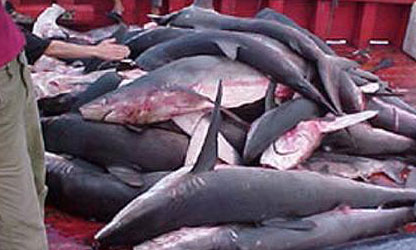
The island communities of both Ecuador and Costa Rica are environmental wonders, drawing visitors from all over the world. And both are World Heritage Sites, ostensibly protected from destructive fishing or other reckless exploitation.
Legal fishing already puts a severe strain on the marine species of the Galapagos (there is no legal fishing around Cocos Island). But greedy poachers, working in cahoots with corrupt officials, are accelerating the crisis. Safeguarded by bribes and payoffs, fishing vessels slink into these waters and illegally harvest cash crops for the Asian market. Taiwanese poachers drop long lines for sharks ó the better to tear off their fins, and use them in shark fin soup. Thousands of mutilated sharks have been found on these vessels and in their ports. In addition, lobsters and sea cucumbers, critical members of the ecosystem, are being decimated. If these trends continue, these irreplaceable marine sanctuaries will be destroyed.
Although both the Costa Rican and Ecuadorian governments reap rich benefits from tourism, their National Park rangers receive little or no support. In Ecuador, for instance, rangers have no power of enforcement; to apprehend poachers, they must call in the Ecuadorian Navy, which often ignores their appeals.
Much of the hope for saving these ecosystems now depends on the actions of a group called Sea Shepherd Conservation Society, which is providing fast, low-emission boats and other logistical support to both Galapagos and Cocos Island rangers. But Sea Shepherd faces daunting obstacles, including harassment and fines, in return for their efforts.
Read Ethical Traveler's Reprint Policy.
